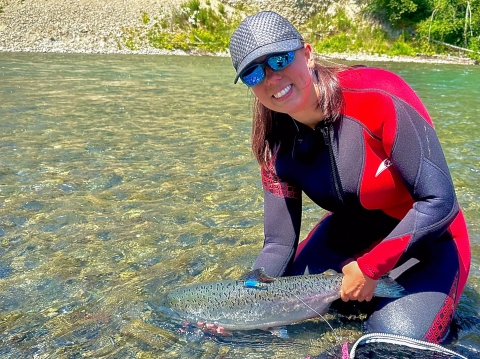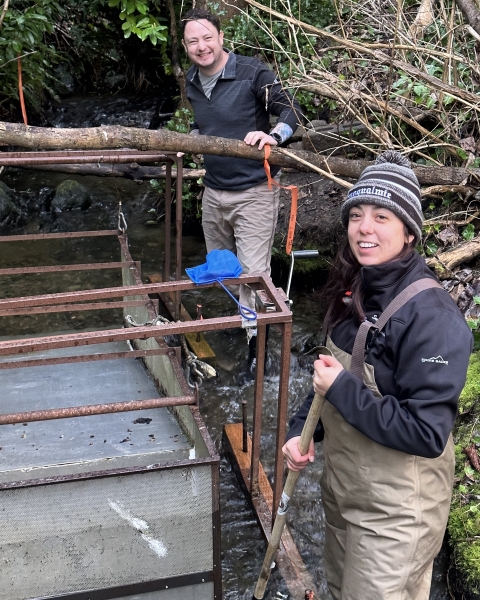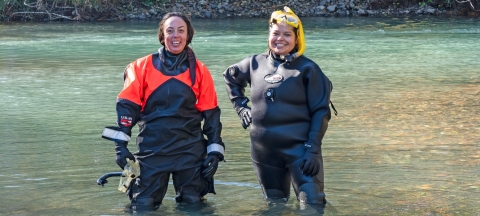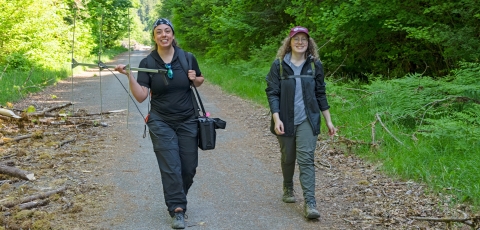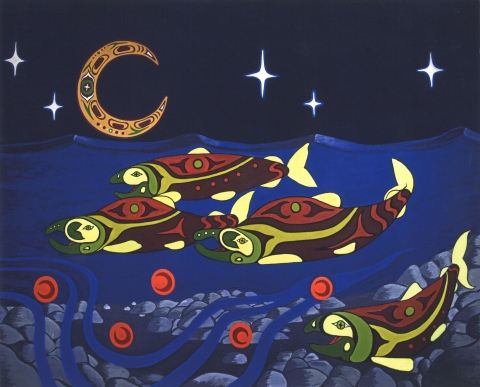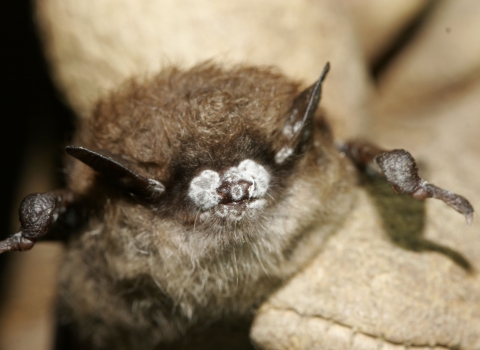By Bethany Fackrell, U.S. Fish & Wildlife Service Intern though Conservation Legacy and the Bureau of Indian Affairs
Editor's Note: Bethany Fackrell served a 6-month internship with the U.S. Fish & Wildlife Service's Washington Fish and Wildlife Conservation office in Lacey, Washington. She also provided valuable support for the Makah, Quilcene, and Quinault National Fish Hatcheries on the Olympic Peninsula as well as a number of conservation partners. Bethany's Tribal "WaterCorps" internship was sponsored by the Bureau of Indian Affairs in partnership with Conservation Legacy. We are thankful for Bethany's hard work and dedication as well as the support from these partners.
---------------------------
Hello there, my name is Bethany Fackrell, and I am a Snoqualmie Tribal member. I come from one of the Point Elliot Treaty Tribes in Washington State. My Tribe lost their federal recognition and regained its federal status in later years, but consequently never regained its fishing rights once re-recognized. This is important to me because I grew up during this time of loss and re-recognition. My love for salmon started when we were granted a one-time fishing right on Lake Washington to celebrate. My uncle, a fish war veteran, brought me to Lake Washington where we salmon fished from dusk till dawn. It was also my first memory of my grandma’s fish head stew. However, sadly I never got to fish again with my Tribe in that way, so I had to find alternatives to be close to salmon. Salmon are a way of life and a way that I connect to our lands, waters, and my community. There is also a spiritual connection between the salmon and me, that goes as far back as in my Tribe’s creation story. Many of us welcome them home with our drums and songs, and our Tribal ceremonies to show our gratitude for their life and how they contribute to the environment around us as we know. During my journey to reconnect with salmon, this internship was shared with me and thought it would be a great way to learn more and even bring a deeper connection.
My internship with the United States Fish and Wildlife Service has meant so much to me; it truly goes beyond a hobby or working in conservation. It has strengthened my connection, knowledge, and passion to work more with salmon on a career scale. I am very proud of the skills and trainings that I was also able to obtain along the way during this 6-month internship.
Prior to my internship and what lead me to apply for this opportunity was volunteering in conservation efforts with local organizations and my cultural practices with natural resources which included Lake Sammamish. A major focus of mine was helping with Lake Sammamish restoration projects because of its high importance to myself and my Tribal community. Part of the reason it is so important to me is because my family lineage resided in multi-generational long houses by this lake. My ancestors would launch their canoes from the creeks you can see around Lake Sammamish today. They would even fish for the kokanee (little red fish) that I have been involved with since 2019. Some of the projects that I have been involved with include the annual kokanee fry count, kokanee fry release, plant restoration, and invasive species invasive species
An invasive species is any plant or animal that has spread or been introduced into a new area where they are, or could, cause harm to the environment, economy, or human, animal, or plant health. Their unwelcome presence can destroy ecosystems and cost millions of dollars.
Learn more about invasive species removal. Lake Sammamish is also where I come to gather and paddle practice in my Tribe’s canoes. Recently through my internship, I got to extend my work by doing kokanee spawning surveys at different creeks that feed into Lake Sammamish. It is a huge honor to keep stewarding the lake and land around it.
During my internship with the U.S Fish and Wildlife Service, I have been able to become a better steward, acquire professional certificates, and learn more about the amazing salmon. I have learned more about invasive species and their impacts on young salmon, as well as the importance of water quality.
I got to assist a biologist on a predator fish project (which was also in the original lake where my Tribe was granted a one-day fishing right) that included collecting and processing bio samples. I got to learn best practices for fish health at Tribal hatcheries and assisted with radio tagging endangered salmon species. I am very proud to have completed my wilderness first aid, white water raft guide school, pro-1 rescue swimming, and electrofishing courses.
By far my favorite experience was being able to utilize skills to assist with snorkel surveys on my ancestral rivers where I got to see a variety of salmon species. Lastly, I was honored to be able to work with the kokanee salmon (again) for spawning surveys. This internship has been one of my greater experiences; it has given me valuable lessons, and has steered me in the direction for a future career with conservation. To me, this is all because of the great support, leadership, and stewardship that the U.S. Fish and Wildlife Service has been able to provide and foster with their interns. I hope to see more Tribal engagements in the future for their BIA interns, especially from the Snoqualmie Tribe!
The strong connection between salmon and culture could not be more clear in this beautiful work by Bethany. The Snoqualmie Tribe is also called The People of the Moon.

